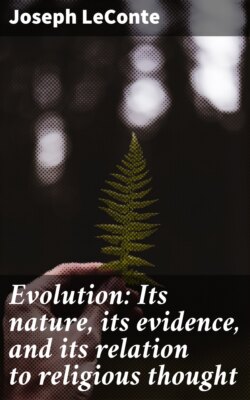Читать книгу Evolution: Its nature, its evidence, and its relation to religious thought - Joseph LeConte - Страница 4
На сайте Литреса книга снята с продажи.
PREFACE TO THE FIRST EDITION.
ОглавлениеTable of Contents
The subject of the following work may be expressed in three questions: What is evolution? Is it true? What then? Surely, there are no questions of the day more burning than these. Much has been written on each of them, addressed to different classes of minds: some to the scientific, some to the popular, and some to the religious and theological; but nothing has yet appeared which covers the whole ground and connects the different parts together. Much, very much has been written, especially on the nature and the evidences of evolution, but the literature is so voluminous, much of it so fragmentary, and most of it so technical, that even very intelligent persons have still very vague ideas on the subject. I have attempted to give (1) a very concise account of what we mean by evolution, (2) an outline of the evidences of its truth drawn from many different sources, and (3) its relation to fundamental religious beliefs. I have determined, above all, to make a book so small that it may be read through without much expense of time and patience. But the subject is so large that in order to do so it was necessary to sacrifice all but what was most essential, and to forego all redundancy (the bane of so-called popular science) even at the risk of baldness and obscurity. Nevertheless, I hope that the first and second parts will be found not only interesting to the intelligent general reader, but even profitable to the special biologist. I have tried to make these parts as untechnical as possible, but I hope not on that account the less scientific. For I am among these who think that it is not necessary to be superficial in order to be popular—that science may be adapted to the intelligent popular mind without ceasing to be science.
The third part seems to me still more important just now. There is a deep and widespread belief in the popular mind, and even to some extent in the scientific mind, that there is something exceptional in the doctrine of evolution as regards its relation to religious thought and moral conduct. Other scientific theories have required only some modifications of religious conceptions, but this utterly destroys the possibility of all religious belief by demonstrating a pure materialism. Now this, I believe, is a complete misconception. Thinking men are fast coming to see this; some, indeed, have mistaken the change for a reaction against evolution. It is a reaction not against evolution, but only against its materialistic implication. Evolution is more and more firmly established every year. The tide of conviction is one which knows no ebb. Some clear statement, in brief space, of its true relation to religious thought seems, therefore, very important at this time.
Berkeley, Cal., May, 1887.
